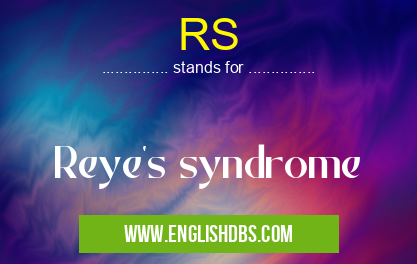What does RS mean in THERAPY
RS (Reye's Syndrome) is a rare but potentially fatal condition that primarily affects children and adolescents. It is characterized by a combination of brain swelling and liver damage. This condition is often associated with the use of certain medications, particularly aspirin.

RS meaning in Therapy in Medical
RS mostly used in an acronym Therapy in Category Medical that means Reye's syndrome
Shorthand: RS,
Full Form: Reye's syndrome
For more information of "Reye's syndrome", see the section below.
What is RS?
RS is a severe condition that affects multiple organs in the body, predominantly the brain and liver. It is characterized by the following symptoms:
- Brain swelling: This can lead to seizures, coma, and even death.
- Liver damage: This can cause jaundice, vomiting, and abdominal pain.
- Other symptoms: Additional symptoms may include fever, rash, and confusion.
How is RS Diagnosed?
Diagnosing RS can be challenging as there is no specific test for the condition. Doctors typically rely on a combination of factors, including:
- Symptoms: The presence of the characteristic symptoms is a key indicator of RS.
- Medical history: A history of recent aspirin use or exposure to other triggers is important.
- Physical examination: This can reveal signs of brain swelling and liver damage.
- Blood tests: Liver function tests and other blood tests can help to confirm the diagnosis.
What Causes RS?
The exact cause of RS is unknown, but it is believed to be triggered by certain factors, including:
- Aspirin use: Aspirin is a common trigger for RS.
- Viral infections: Some viral infections, such as chickenpox and influenza, have been linked to RS.
- Other triggers: Other potential triggers include certain medications, metabolic disorders, and environmental toxins.
Treatment for RS
There is no specific cure for RS, but treatment focuses on managing the symptoms and preventing complications. This may include:
- Intravenous fluids: To prevent dehydration and electrolyte imbalances.
- Anticonvulsants: To control seizures.
- Liver support: To manage liver damage.
- Monitoring: Close monitoring of vital signs and neurological function is essential.
Essential Questions and Answers on Reye's syndrome in "MEDICAL»THERAPY"
What is Reye's syndrome (RS)?
Reye's syndrome is a rare but potentially fatal condition that affects the brain and liver. It is most commonly seen in children who are recovering from a viral infection, such as the flu or chickenpox.
What causes Reye's syndrome?
The exact cause of Reye's syndrome is unknown, but it is believed to be triggered by a combination of viral infection and the use of aspirin or other salicylate-containing medications. Aspirin should never be given to children or teenagers with viral infections.
What are the symptoms of Reye's syndrome?
The symptoms of Reye's syndrome can vary, but they typically include:
- Vomiting
- Lethargy
- Confusion
- Seizures
- Liver failure
- Encephalopathy (swelling of the brain)
How is Reye's syndrome diagnosed?
Reye's syndrome is diagnosed based on a combination of symptoms, blood tests, and a liver biopsy.
How is Reye's syndrome treated?
There is no specific cure for Reye's syndrome, but treatment can help to manage the symptoms and support the body's recovery. Treatment may include:
- Intravenous fluids
- Medications to control seizures and swelling
- Liver transplantation in severe cases
What is the prognosis for Reye's syndrome?
The prognosis for Reye's syndrome varies depending on the severity of the condition. With early diagnosis and treatment, most children recover fully. However, some children may experience permanent brain damage or liver failure.
How can Reye's syndrome be prevented?
The best way to prevent Reye's syndrome is to avoid giving aspirin or other salicylate-containing medications to children or teenagers with viral infections. Parents should also be aware of the symptoms of Reye's syndrome and seek medical attention immediately if they suspect their child may have the condition.
Final Words: RS is a serious condition that can have life-threatening consequences. Early diagnosis and treatment are crucial for improving outcomes. If you or your child experience any symptoms of RS, seek immediate medical attention.
RS also stands for: |
|
| All stands for RS |
